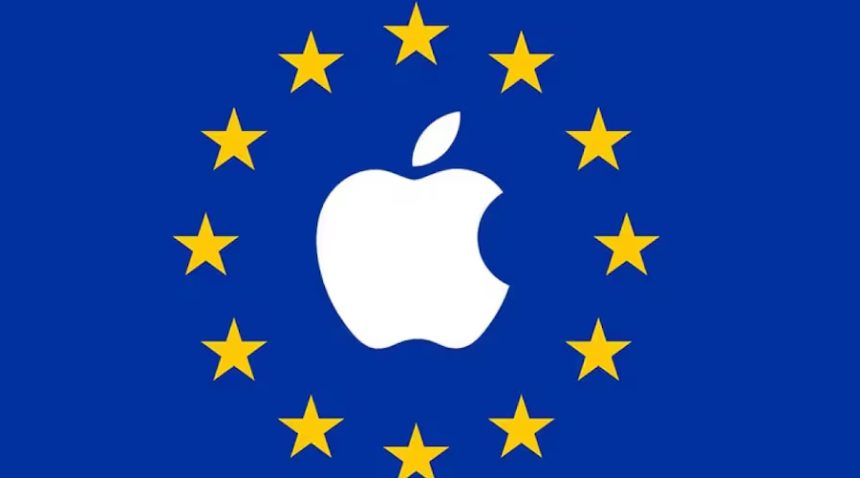Is Apple above the law? The EU says no, and has already fined the tech giant €500 million
Apple, one of the world’s biggest technology companies, is now at the center of a major legal and political battle with the European Union (EU). This fight is focused on the EU’s new Digital Markets Act (DMA), a law created to make digital markets fairer by reducing the power of large tech companies.
The EU wants to ensure that smaller businesses can compete fairly, while Apple is trying to protect its tightly controlled ecosystem. The result is a growing conflict with major financial penalties and legal challenges.
What Is the Digital Markets Act
The Digital Markets Act is a law introduced by the EU to limit the power of large tech companies like Apple, Google, Amazon, Meta, and Microsoft. These companies are called “gatekeepers” because they control access to key digital services, such as app stores, operating systems, or search engines.
Under this law, companies like Apple must follow strict rules, including:
Allowing users and developers to choose where and how they buy apps.
Letting apps communicate freely with users (for example, apps can tell users about cheaper options outside the App Store).
Making sure other devices and services can work smoothly with Apple’s iOS system.
Not favoring their products or services over competitors.
If a company fails to follow these rules, the EU can fine them up to 10% of their global yearly income. For Apple, this could mean billions of euros.
Apple’s First Fine and Ongoing Dispute
In early 2025, Apple was fined 500 million euros by the EU. This fine was based on Apple’s refusal to let apps tell users about cheaper ways to pay for services outside the App Store. Apple’s policy forced developers to use its payment system and charged them high commissions.
The EU said this practice was unfair and hurt both developers and users. Apple disagreed, saying its system protects users and ensures safety.
Interoperability: A Big Challenge for Apple
One of the toughest requirements of the DMA is interoperability. This means Apple must allow other companies’ products, like smartwatches, headphones, or fitness trackers, to connect easily with iPhones.
Apple usually keeps its system closed to maintain quality and security. But now, under EU law, it must let competitors access certain parts of its system, such as notifications and wireless connection tools. This opens the door for competitors to offer better services that work well with iPhones.
Apple Fights Back in Court
In May 2025, Apple took legal action against the EU. The company argued that the new rules were too extreme and could harm users. Apple claimed:
Sharing data like notifications or Wi-Fi access with other companies could weaken privacy and security.
Building systems to meet EU rules would require hundreds of engineers and slow down future innovation.
The company is being treated unfairly compared to other tech firms like Google or Meta.
Forced changes might damage the Apple brand and the smooth experience users expect.
Apple even warned that it might remove features like AirDrop from iPhones sold in Europe if it cannot protect them under the new laws.
How the EU Responded
The European Commission, which enforces EU rules, said Apple must follow the law. Officials insisted that the DMA is not about punishing companies, it’s about making digital markets open and fair.
They also made it clear that Apple must follow the rules even while its court appeal is ongoing. If the company refuses, it could face even larger fines or stronger actions, including breaking up parts of its business in Europe.
Global Reactions and U.S. Involvement
This conflict between Apple and the EU is not just a local issue. It affects global trade and relationships. Some U.S. officials say the EU is unfairly targeting American companies and acting like it’s imposing extra taxes.
At the same time, U.S. courts have also started to question Apple’s business practices. For example, some judges in the United States have supported the idea that Apple should let apps guide users to cheaper payment options. This shows growing pressure on Apple from both sides of the Atlantic.
Other countries, including India, are watching closely and may introduce similar rules in the future.
What Developers and Users Are Saying
App developers, especially smaller ones, support the EU’s efforts. They believe Apple has made it too difficult and expensive to reach users through the App Store. The DMA could give them more freedom and allow them to offer better prices.
Consumers are less involved in the debate, but many user groups agree with the EU’s goals. They want better choices, lower costs, and more compatibility between devices.
However, some people worry that opening up Apple’s system too much could make phones less secure or reduce the smooth performance that Apple is known for.
What Could Happen Next
This legal fight is far from over. Apple’s court case against the EU could take several years. In the meantime, the company must still follow the rules. If it doesn’t, more fines will likely follow.
To deal with the situation, Apple might:
Make special versions of iPhones for Europe that remove or limit certain features.
Build new systems that meet EU rules without giving up control completely.
Use legal and political pressure to slow down or change parts of the law.
Try to negotiate compromises behind the scenes.
Some experts believe Apple will eventually comply, but in a way that still protects its ecosystem as much as possible.
Big Picture: A Fight Over the Future of Tech
This battle is about more than just app stores and device compatibility. It reflects two different ideas about how technology should work.
The EU wants digital markets to be open, competitive, and fair. It believes users should have real choices, and that big tech companies should not be allowed to control every part of the digital experience.
Apple, on the other hand, believes in protecting its design, privacy, and product quality—even if that means keeping its system closed. The company says this is what users expect when they buy Apple devices.
The outcome of this conflict will affect not just Apple but the entire tech industry. It could change how smartphones work, how apps are sold, and how much control big tech firms have over digital life.
Apple’s battle with the European Union is one of the most important tech disputes in recent years. It tests how far governments can go in regulating powerful companies—and how much those companies are willing to fight back.
For now, the answer to whether Apple can defy EU rules remains unclear. But what’s certain is that the fight is far from over, and the decisions made in the next few years could reshape the digital world for everyone.





